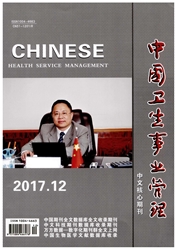

 中文摘要:
中文摘要:
目的:了解厦门市“三师共管”慢病管理模式对居民社区首诊行为的影响。方法:根据经济水平和分级诊疗开展状况,抽取厦门市5个社区,采用自行设计的问卷开展调查;应用x^2检验和logistic回归模型分别对居民社区首诊行为的影响因素进行单因素和多因素分析。结果:共调查400名社区居民,回收有效问卷399份。被调查的社区居民中了解“三师共管”者占37.3%;加入“三师共管”者占21.8%;53.4%的社区居民首诊医疗机构为社区医院。单因素分析结果显示,了解“三师共管”和加入“三师共管”者选择社区医院首诊比例更高(P〈0.001)。多因素logistic回归分析结果显示,了解“三师共管”者选择社区医院首诊是不了解者的2.49倍(OR=2.49,95%CI=1.44—4.30);加入“三师共管”者选择社区医院首诊是不了解者的2.12倍(OR=2.12,95%CI=1.11~4.06);了解且加入“三师共管”者、不了解但加入“三师共管”者和了解但未加入“三师共管”者社区医院首诊行为是不了解且未加入“三师共管”者的3.09倍(OR=3.09,95%CI=1.38~6.95)、2.94倍(OR=2.94,95%CI:1.54~5.59)和3.07倍(OR=3.07,95%CI=1.16~8.15),.结论:“三师共管”模式对居民社区首诊行为有积极影响,且了解和加入该模式的联合作用效果更好,为巩固改革效果还需要进一步提升“三师共管”模式的知晓率和管理率。
 英文摘要:
英文摘要:
Objective To get knowledge of the effect of chronic disease management mode of “co - management of doctors of three kinds” on residents' willingness of community first visit behavior in Xiamen. Methods According to the economic levels and the status of implementation of hierarchical medication in different regions of Xiamen, we sampled five communities as our research objects. Self - designed questionnaire was used to get information from the participants. Chi - square analysis and logistic regres- sion models were used to explore the influence factors of residents ' willingness to choose community as first visit. Results Totally, 400 community residents were investigated in our research, and 399 valid questionnaires were collected. The awareness rate of the management mode of “co -management of doctors of three kinds” among the residents was 37.3%. The participation rate of the work mode was 21.8% ; and 53.4% of the residents will choose community as their first visit medical institution. Univariable a- nalysis results showed that residents who have known and joined this work mode will be more willing to choose community for their first medical visit ( P 〈 0. 001 ). Muhivariable logistic regression analysis results showed that the odds ratio(OR) of choosing com- munity hospital at first visit was 2.49, comparing those who were aware of the work mode to those who were not ( 95 confidence in- terval [ CI ] = 1.44 - 4. 30) ; similarly, having participated in the work mode of “co - management of doctors of three kinds” were more likely to choose community hospital, compared with those who knew nothing about it (OR = 2. 12, 95% CI = 1.11 4.06); the ORs were 3.09 (95%CI = 1.38 -6.95), 2.94 (95%CI = 1.54N5.59), 3.07 (95%CI = 1.16-8.15) re- spectively, when comparing those who knew and joined it, or those who didn' t know but took part in it, or those who knew but haven' t participated in it, to those who did neither know nor join it. Conclusion The study indicates that
 同期刊论文项目
同期刊论文项目
 同项目期刊论文
同项目期刊论文
 期刊信息
期刊信息
